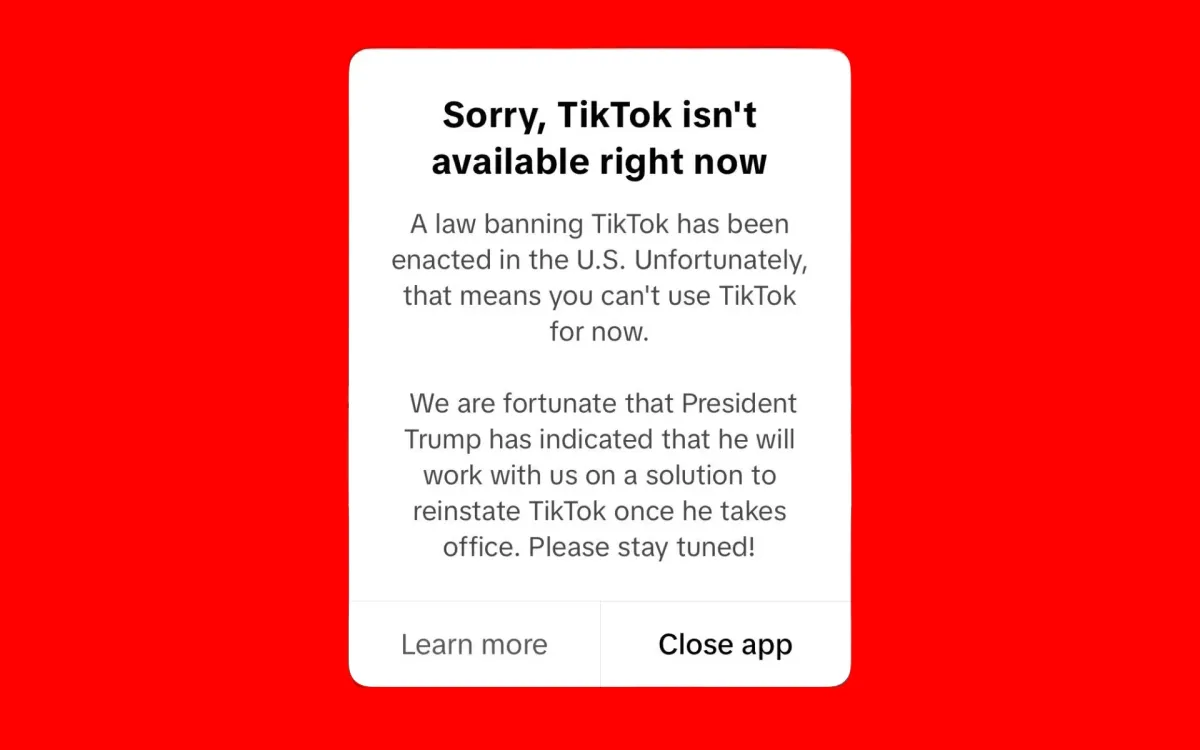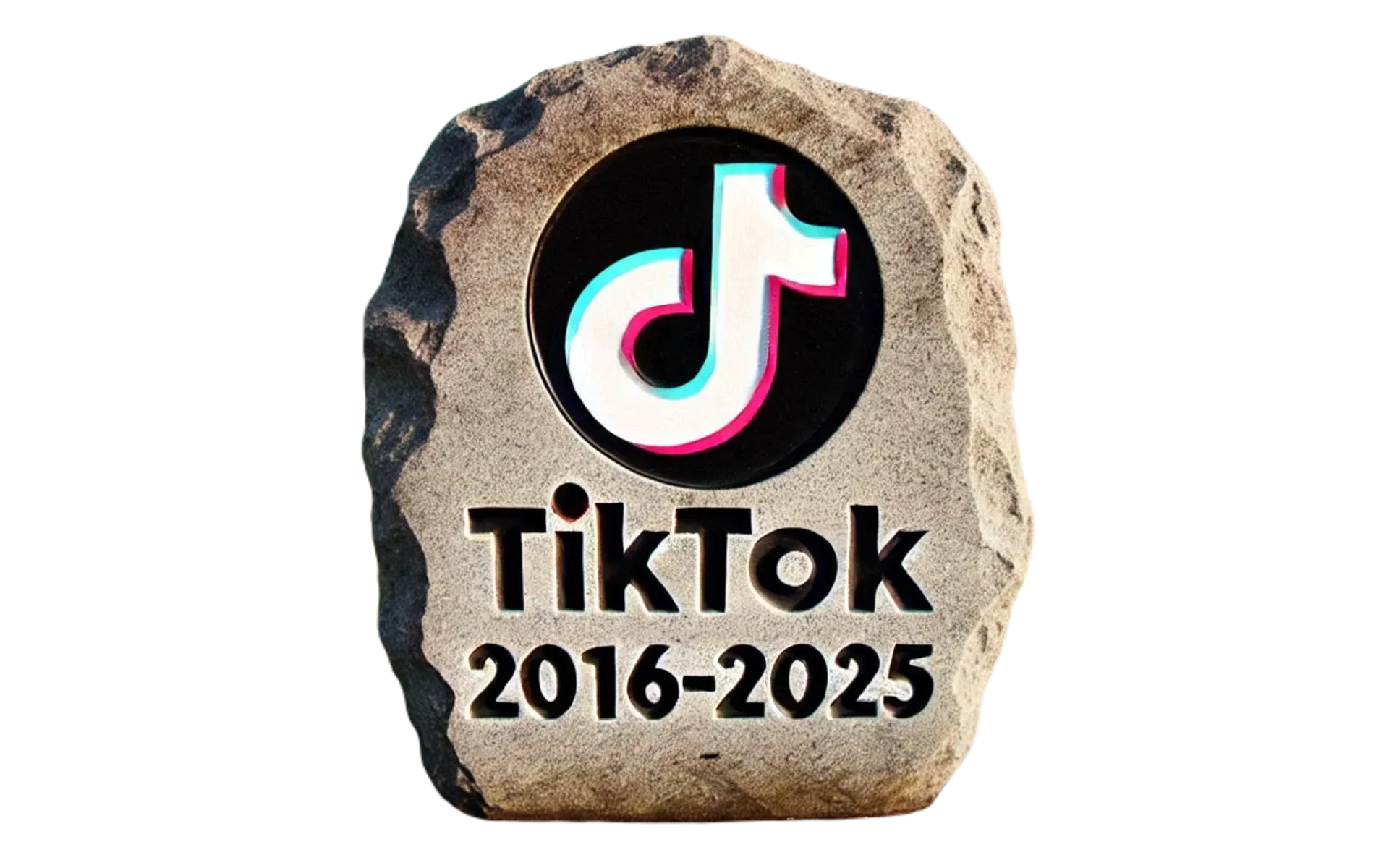
TikTok stopped working for 170 million American users late Saturday night, marking a historic moment in US social media regulation after the Supreme Court unanimously upheld legislation requiring the platform to separate from its Chinese parent company ByteDance.
Users attempting to access the app after 10:45 p.m. Eastern Time on January 18 were met with a message stating: "A law banning TikTok has been enacted in the U.S. Unfortunately, that means you can't use TikTok for now." The platform simultaneously disappeared from Apple and Google app stores, along with other ByteDance-owned applications including video editing tool CapCut and lifestyle app Lemon8.
Apple released detailed guidance for US users, confirming that while previously installed ByteDance apps will remain on devices, they cannot be redownloaded if deleted or restored on new devices. The company also warned that users won't receive future updates, which could impact performance, security, and compatibility with future operating system versions. The restrictions affect a broader suite of ByteDance applications, including TikTok Studio, TikTok Shop Seller Center, Hypic, Lark collaboration tools, and Marvel Snap.
The shutdown follows Friday's Supreme Court decision validating the Protecting Americans from Foreign Adversary Controlled Applications Act. Chief Justice Roberts, writing for the Court, emphasized that the legislation targets national security concerns rather than restricting free speech. According to Congressional findings cited in the 20-page ruling, TikTok collects extensive personal data including precise location information, device details, private messages, and viewing history from American users.
The Protecting Americans from Foreign Adversary Controlled Applications Act (PAFACA) is a U.S. law aimed at safeguarding national security by addressing the potential risks posed by mobile applications controlled by foreign adversaries, primarily those from countries like China, Russia, Iran, and North Korea. This legislation empowers the U.S. government to ban or compel the divestiture of such applications if they are deemed a threat to national security. The primary concern is that these applications could be used to surveil American citizens, manipulate public opinion, or collect sensitive data that could be exploited against U.S. interests.
 PPC LandLuís Rijo
PPC LandLuís Rijo

ByteDance's legal obligations under Chinese law factored heavily into the Court's analysis. Justice Sotomayor, in a concurring opinion, noted that while TikTok serves as an important platform for expression, the government demonstrated compelling national security interests in restricting foreign access to American user data.
The legislation provides multiple compliance pathways for TikTok, including a "qualified divestiture" separating US operations from Chinese control. Previous attempts by ByteDance to negotiate alternative arrangements with US officials in 2021 and 2022 failed to adequately address security concerns, according to court documents.
President-elect Donald Trump, who takes office on January 20, indicated potential flexibility in implementing the ban. "The 90-day extension is something that will be most likely done, because it's appropriate," Trump told NBC News on Saturday. TikTok CEO Shou Zi Chew plans to attend Trump's inauguration, signaling the company's hope for a resolution that would allow continued operations.
The Chinese embassy in Washington criticized the US action. "China will take all necessary measures to resolutely safeguard its legitimate rights and interests," a spokesperson said on Friday.
The platform's uncertain future has sent users scrambling to alternatives, with some migrating to China-based RedNote. Major technology companies Meta and Snap saw their share prices rise this month as investors anticipated a potential influx of users and advertising revenue.
Private equity firms and technology companies have expressed interest in acquiring TikTok's US operations, which analysts estimate could be worth up to $50 billion. US search startup Perplexity AI submitted a merger proposal on Saturday, according to sources familiar with the situation.
The case represents a significant development in the intersection of national security, corporate ownership, and digital rights as nations grapple with data sovereignty in an interconnected world. With ByteDance about 60% owned by institutional investors like BlackRock and General Atlantic, the company faces complex decisions about restructuring its corporate relationships or potentially abandoning the lucrative US market.
TikTok with a VPN?
Technical barriers implemented by ByteDance when TikTok went dark have proven more comprehensive than anticipated. While many users wondered what time TikTok would shut down, the platform ceased operations at 10:45 PM ET, earlier than expected.
Questions about when TikTok will come back and where TikTok is not banned have flooded social media platforms. According to multiple user reports from across the globe, TikTok's shutdown mechanism extends beyond simple geographical restrictions, operating on multiple verification layers that affect users worldwide, not just in countries where TikTok is banned.
The platform's sophisticated detection system checks device identifiers and account origins, with users from regions where TikTok remains available reporting access issues if their accounts were originally created in the United States.
International travelers to America have found their previously functioning accounts restricted within US borders, regardless of their account's country of origin.
Even users physically located in countries where TikTok is not banned cannot access US-created accounts, demonstrating the ban's technical complexity. These restrictions apply universally across mobile applications and web browsers, creating what some users have dubbed the "TikTok graveyard" as the 2024 wrapped feature becomes inaccessible.
The timing of when TikTok will be unbanned remains uncertain, pending potential corporate restructuring or ownership changes.

